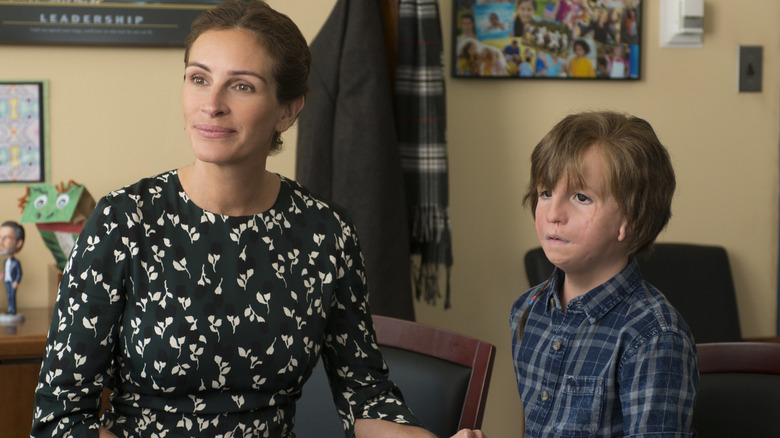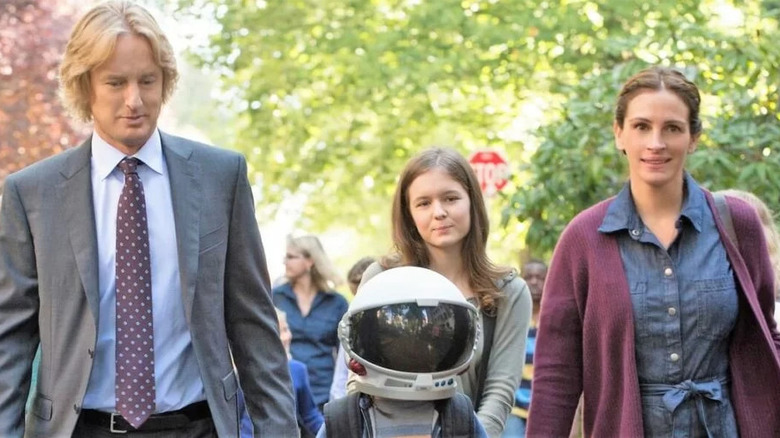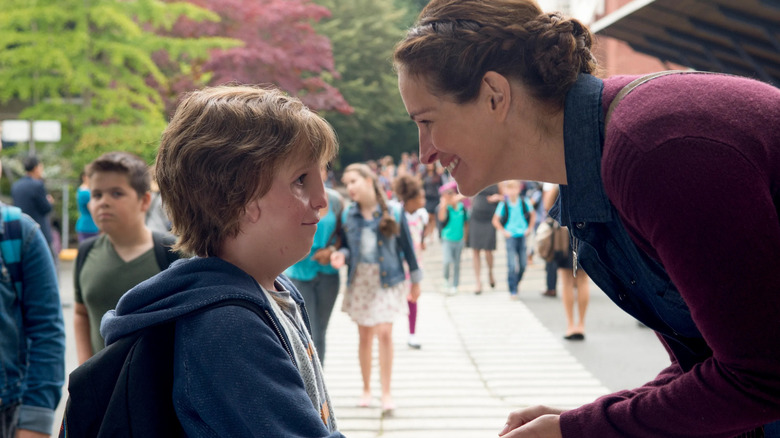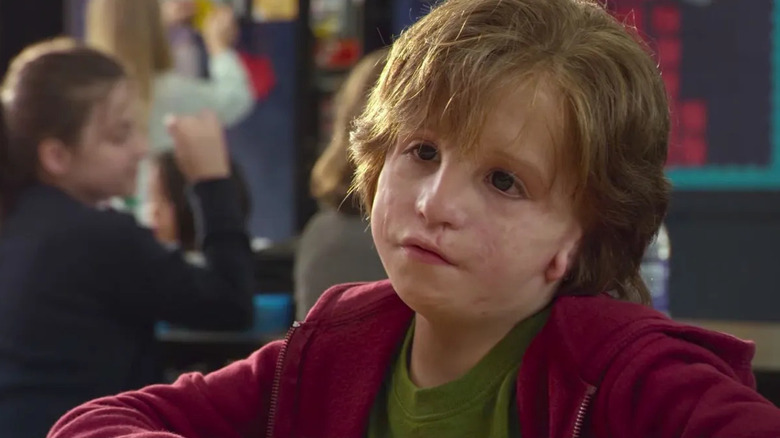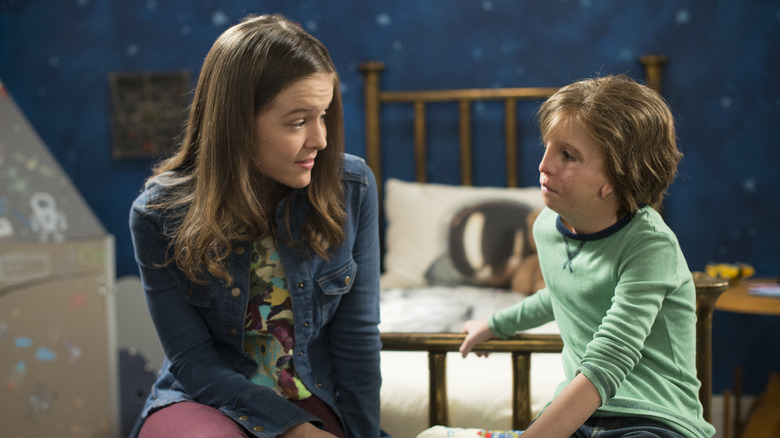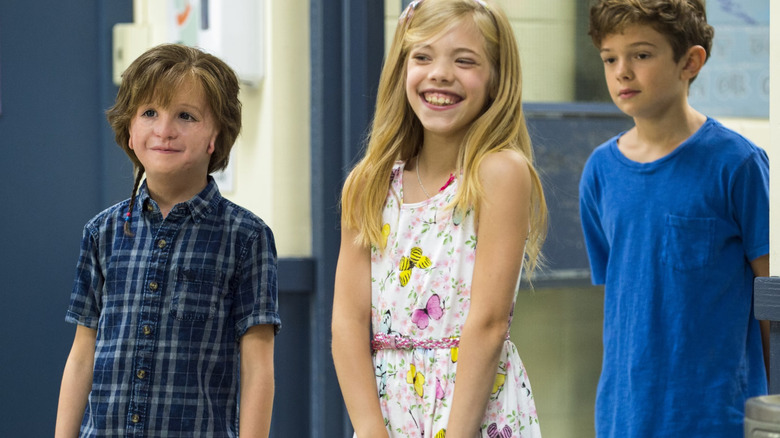Is Wonder Based On A True Story?
Whether it be their lack of filter or naïveté, kids can be cruel, often pointing out or making jabs about aspects that you cannot change about yourself. As someone who grew up wearing hearing aids and following a special diet, I learned firsthand how kids could make you feel awful just for being different. Stephen Chbosky's gentle, family-friendly film "Wonder" addresses these ideas of acceptance and bullying in a story about a boy named August "Auggie" Pullman, who has Treacher Collins syndrome, as he tries to fit in at his new private school after being homeschooled his whole life.
Though it sounds simple and even overly sentimental, "Wonder" professes the adage, "When given the choice between being right or being kind, choose kind." This is typically the last choice we make when we're afraid, uncomfortable, or just want to fit in. Too often, children and adults put kindness on the back burner to look out for themselves, pulling others down in an attempt to lift themselves up. "Wonder" has an uplifting message that everyone can identify with, but especially for those with disabilities who often experience a world that isn't very kind.
Wonder isn't based on true events, but it has real-life influences
The 10-year-old Auggie, his parents, Isabel and Nate, and older sister Via are fictional characters. Auggie's journey at Beecher Prep dealing with bullies, being photoshopped out of the class picture, and winning the science fair is brought to the screen by writers Stephen Chbosky, Steven Conrad, and Jack Thorne, based on the novel by R.J. Palacio. The challenges the Pullmans go through, however, are real for so many families.
According to the American Cleft Palate Craniofacial Association, Treacher Collins syndrome (TCS) is a rare genetic disorder, also known as mandibulofacial dysostosis, that affects 1 in 50,000 newborns. Although this is a rare disease, there are many children who live with TCS or other similar facial differences.
While "Wonder" delicately showcases the experiences faced by those living with a disability and their family members, the movie and book can resonate with anyone who has ever struggled to fit in. Everyone can relate to feelings of isolation, loneliness, or being made to feel different. Palacio once recalled receiving an email from a 91-year-old woman after the release of her book, who shared a memory about girls being nasty to her in the lunchroom when she was 13. As she told NPR in 2013:
"I read it to kids when I speak to them because it reminds them just how much their actions are remembered by people, and do you want to be remembered eight decades later by someone for an act of unkindness or an act of kindness. Your actions are remembered, and you have the power to not only make someone's day, but to change someone's life."
This powerful message is what makes "Wonder" so inspiring. Even if the finer details are fictionalized, the movie has a strong real-life impact.
Wonder raises awareness about Treacher Collins Syndrome
The Texas Children's Hospital reports that Treacher Collins Syndrome (TCS) affects the development of the skull and facial bones, often creating misshapen cheekbones and a small chin. The eyes of individuals with the condition are typically slanted, and their ears may be so small that they cause hearing loss. These facial differences can also lead to other issues, such as difficulty breathing, speech impairments, and problems with eating or drinking. This means that those with TCS often have to have extensive surgeries.
Even though Auggie in "Wonder" is only 10 years old, he has already undergone 27 surgeries by the time the story begins. Unfortunately, this is a reality for many children with TCS or other facial differences. It's not only scary for parents to see their child's little bodies having to undergo medical trauma, but also for the child themself, who may not fully understand what is happening during these life-saving procedures.
Who plays Auggie?
"Wonder" is one of Julia Roberts' best films because her warm but fierce "mama bear" Isabel is such a memorable character, and the perfect match for Owen Wilson's laid-back and affectionate nature as Nate. Together, they form one of the sweetest pairs of on-screen parents. Meanwhile, their son Auggie is played by Jacob Tremblay, who had previously starred in "Room," another project loosely based on real-life events.
Tremblay brings a soft mix of gentleness and bravery to the character of Auggie. However, some critics took umbrage with the young, non-disabled actor playing a character with facial differences, including Ariel Henley, a writer for Teen Vogue with Crouzon syndrome. As she wrote in 2017:
"To suggest that people with craniofacial disorders, who so desperately want to see themselves reflected in mainstream media, should be grateful for this movie, while ignoring all the ways in which this story and the casting are problematic, only perpetuates our marginalization."
She also lamented that "it was devastating to realize that the directors involved with 'Wonder' would rather cast a healthy, 'normal' looking child and put him in makeup and prosthetics, rather than cast someone who looked like me."
While it is refreshing to see a popular culture character with facial differences that isn't a villain, there's still progress to be made. The casting of talent actors like Adam Pearson, a man with neurofibromatosis type 1 (NF1), in the dark comedy "A Different Man" shows that people with disabilities should have the opportunity to play their own parts, as well as a diverse collection of roles.
Author R.J. Palacio was inspired by a chance encounter in an ice cream shop
The "Wonder" movie and book are incredibly well-written, offering multiple perspectives on how society views disability. Some are unkind, others are indifferent, while some shield themselves out of discomfort with something that is outside the norm. Back in her 2013 interview with NPR, Palacio revealed that her inspiration for "Wonder" was an experience with disability that she regretted. Once, when she sat down next to a young girl with severe facial differences in an ice cream shop, Palacio's son became scared and started crying. She quickly left. As Palacio explained:
"I was really angry at myself afterwards for the way I had responded. What I should have done is simply turned to the little girl and started up a conversation and shown my kids that there was nothing to be afraid of. But instead, what I ended up doing was leaving the scene so quickly that I missed that opportunity to turn the situation into a great teaching moment for my kids. And that got me thinking a lot about what it must be like to [...] have to face a world every day that doesn't know how to face you back."
This experience inspired Palacio to create "Wonder," an uplifting story meant to encourage people to break through these walls that we put up for ourselves when we fear what is different.
The title of Wonder is based on Natalie Merchant's 1995 song
For her book's title, Palacio borrowed from Natalie Merchant's "Wonder." As Merchant once explained to the BBC, her song is similarly about a child born with a congenital disease, based on twins she knew who had epidermolysis bullosa (which causes skin and membrane blistering). Merchant's delicate, acoustic folk sound and soulful vocals create a moving piece of music. The lyrics describe doctors being shocked by what they see, questioning how this could possibly be one of God's creations. Merchant assures the listeners that the child will prevail and overcome any struggles, especially with love, patience, and faith.
The title "Wonder" also refers to how children often view the world with awe, amazement, and curiosity. The story teaches us that we must take our fascination and turn it into a practice of kindness rather than cruelty.
